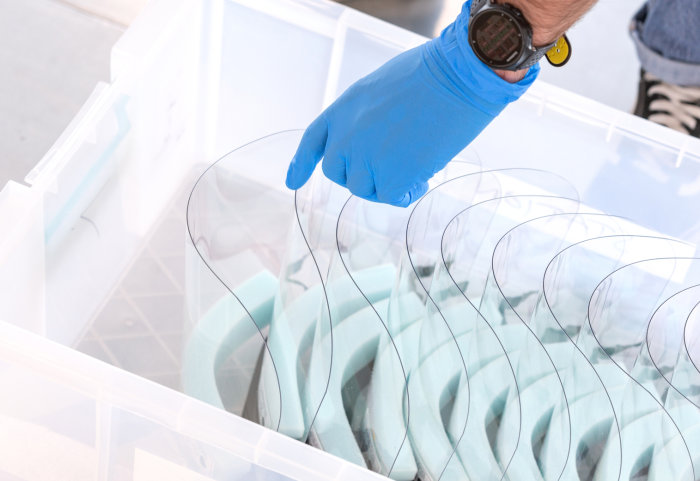Engineering research aims to reduce PPE skin injuries

PPE visors assembled by volunteers at Imperial
Dr Marc Masen from the Department of Mechanical Engineering leads the cross-departmental project.
As part of Imperial's COVID-19 Response Fund, engineering researchers have won a grant for a project aimed at reducing skin injury caused by prolonged use of Personal Protective Equipment (PPE). Over the past week, more than 25 people from across the Faculty of Engineering have been working individually and in teams, liaising with medical staff, experimenting with PPE, and reading standards and guidelines to develop an Engineering Specification.
PPE, including goggles, visors, respiratory masks and surgical masks are important tools in the battle against COVID-19 infection, both for medical personnel and the general public. However, prolonged wearing of PPE can cause a range of skin issues, including discomfort, irritation and injury.
Irritation reduces an individual's ability to wear PPE, while wounds due to skin tearing may provide a potential entry point for viruses and can also be extremely painful, rendering staff out of action. This situation is expected to worsen with the advance of summer because of increasing temperatures, humidity and perspiration.
Dr Marc Masen, Principal Investigator on the project, explains: "The main advice on treatment is to apply a thick layer of petroleum jelly at 30-minute intervals, which may not be a workable strategy in an intensive workplace such as an ICU ward. The current focus in the project is on the rapid delivery of an improved, robust and workable solution for NHS staff. The longer-term focus is to also develop a practical solution to improve the interaction of generic face masks with skin.
We have investigated skin injury pathways and assessed the wide range of commercially available powders, lubricants and dressings to assess their functionality. We also identified a range of aspects that will need to be solved simultaneously to enable us to deliver optimised solutions. Our current ambition is to also follow up on several of these, including performing a detailed survey of the actual problems in hospitals and a more scientific assessment and quantification of device-induced skin injuries. We will also be liaising with existing partners of the department who manufacture PPE to assist them in optimising their designs to increase comfort and reduce injury."
Article text (excluding photos or graphics) © Imperial College London.
Photos and graphics subject to third party copyright used with permission or © Imperial College London.
Reporter
Press Office
Communications and Public Affairs
- Email: press.office@imperial.ac.uk
